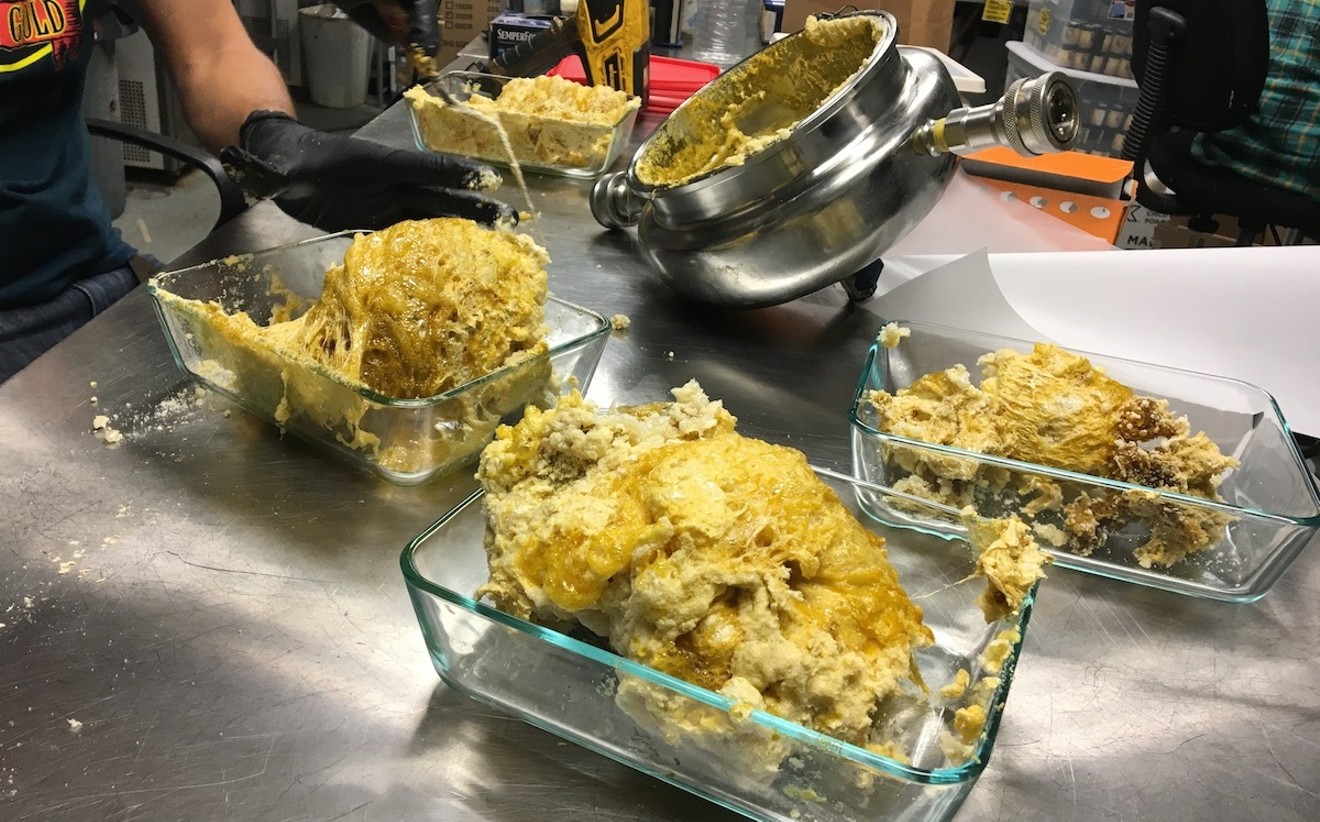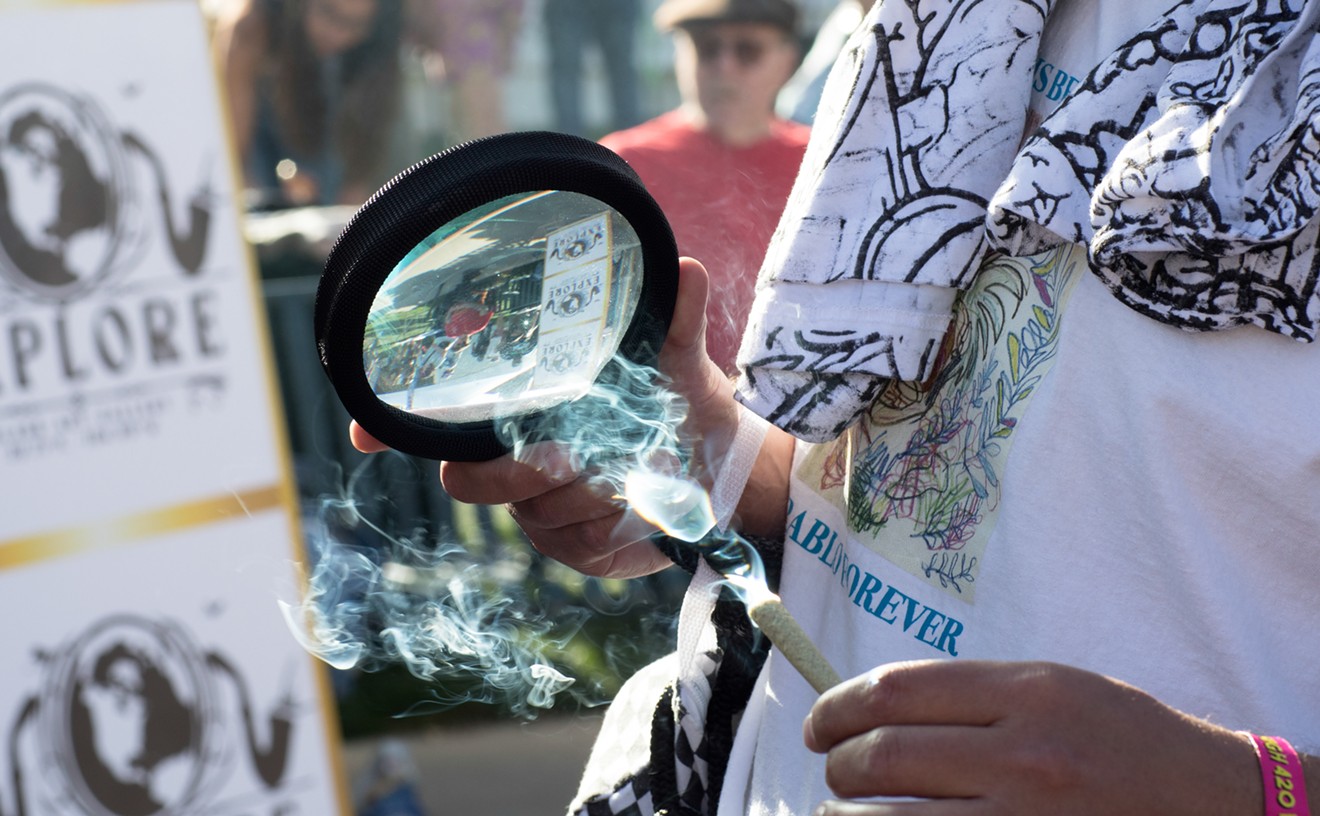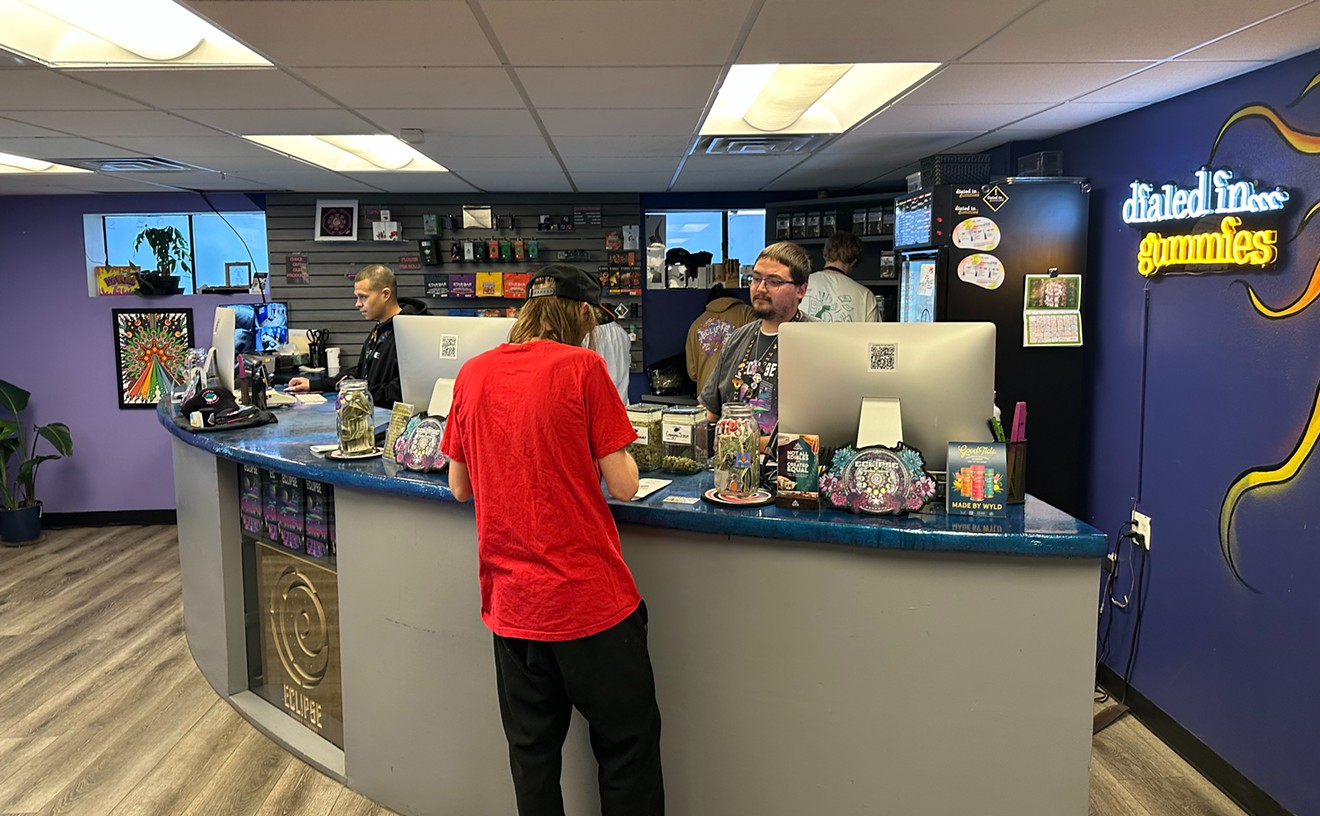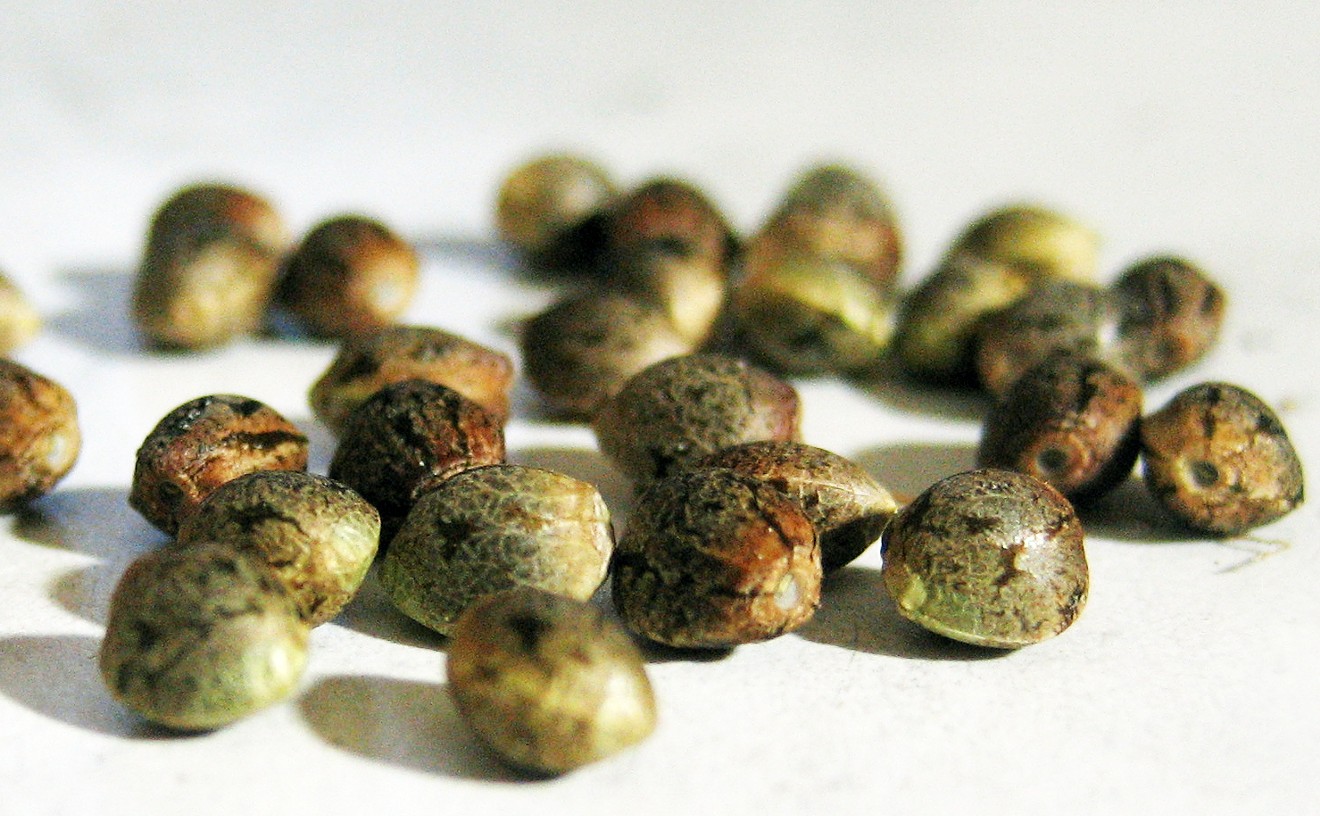As cannabis industry experts and commercialization opponents continue to warn about the big-tobacco takeover of legal pot, we know that at least one local operation doesn't want any part of Philip Morris. “We don’t want to be Jim Beam; we’re Leopold,” explains Joe Patierno, general manager of Kush Concentrates.
Patierno would rather compare his small-batch hash operation to Leopold Bros., a Denver-based small-batch whiskey distillery, than to a large commercial operation. Kush Concentrates is a boutique extraction operation led by Patierno, who came from the tech industry with a background in sales and marketing, and Dan “Nardo” Leonardo, the head extractor (or hash wizard, as he’s referred to in the lab), a former hash hobbyist from New York who has been extracting in-house for just over a year. The intimate setting hosts a total staff of six, which includes two additional extractors and two packaging employees.
Their desire to build the lab stemmed from the popularity of concentrates at Kush Concentrate's partnering dispensary in the Five Points neighborhood, Denver Kush Club. “A lot of people who get high only smoke concentrate,” says Denver Kush Club manager Grace Kiefaber. “Our customers love the strains we grow, so it made sense to expand to concentrates. There was a time when we were buying it from other companies, and the quality was just not there. We knew that we could do something way better, and now the possibilities are endless.”
“Electric Relaxation,” by A Tribe Called Quest, booms on the speakers as Patierno leads his first-ever tour of the facility. There is a bridge from the lab to an on-site grow, just smaller than a barn, which houses around 700 plants from about a dozen different strains. Patierno explains that the sister grow in Pueblo is about eight times the size, which, if you do the math, equals a nursery of more than 5,500 plants. The house grow is crucial to Kush Concentrates, according to the team, as it's the main supplier of wax, shatter, live resin, terp sauce and vaporizer cartridges for Denver Kush Club. It’s a familial operation, to say the least.
The process begins with raw materials – both dry trim and fresh-frozen product (where the plant is harvested and immediately cryogenically frozen). “They slate entire plants for us,” Nardo says of the quality of frozen materials. “The immediate freeze locks in all of the plant molecules, which gives it that terpene flavor, a fuller spectrum and more content."
“This helps to create the best-looking, best-tasting and best-quality live resins and sauces,” adds Patierno. After the plant is cut down and frozen, extraction should begin within five days to a week, ensuring that cannabinoids and terpenes, which contribute to higher potency, smell and flavor, will be retained.
“Getting in a batch of specific strain is important to us, because we are strain-specific, and that’s what makes us small-batch hash; it all starts with the raw materials,” Patierno explains. According to Nardo, the process ends up running better when the plant is strain-specific, as opposed to a mixed batch. “Sometimes it just doesn’t come out the way you want it to,” he says of mixing strains. “Plus, if you can’t give a customer a sativa or an indica, they might end up feeling all over the place.”
Once the raw materials are gathered, Nardo and the extraction team decide on the course the hash will take. The Kush Concentrates lab currently runs only two precision extraction machines, which can handle three-pound batches. The blasting process comes next, where hydrocarbon solvents are used to extract THC from the flower – propene is used for wax, while butane is used for shatter. Then pressure is applied to remove the solvents, and what is left is the hash in its most concentrated form.
After blasting, the batch is transferred into casserole-style dishes, where the extractors whip the product into the desired consistency. Then the hash casserole goes into the oven, where any remaining solvents are burned off. The hash is purged, whether wax (propane) or shatter (butane) is the final product, but the time and temperature of the cooking can differ, as shatter takes longer than wax. The goal is to remove all impurities (including plant waxes and fats) before the timer can ding.
Kush Concentrates also caters to the discerning palate of weed snobs. “Some people want the most concentrated THC potency, and they don’t care what it tastes like,” Patierno says. “Other people know they are going to consume enough to feel their desired effects, so they want something that has a better flavor profile, or something that is a little less harsh on their throat. A bit of live resin in your own hash pen gives you a flavor you are never going to get from anything else.” In addition to live resin, which maintains its flavor profile thanks to flash-freezing cannabinoids and terpenes, Kush Concentrates now also offers its own line of terp sauce, a potent line of concentrate with even more terpenes added for flavor.
“I definitely encourage the people who show interest to smell the sauce. What sets it apart from other concentrates is its amazing smell and taste – it smells incredible, exactly like the flower it's made from, ” Kiefaber says.
Taste gets complicated, though, when it comes to distillate. Terpenes provide the flavor, but they are destroyed when making distillate, which focuses on THC and little else. “You are trying to still just the THC by running crude extract and leaving anything else behind,” Nardo explains. As a result, he and his team use added terpenes to re-flavor distillate cartridges. “A 300-gram batch of cartridges requires just a few terpene drops, since terpenes are so strong,” he notes.
On the other hand, the Kush Concentrates traditional cartridge oil does not go through the distillation process. Instead, it is jarred and cooled in dry ice to help remove the fats and lipids. The hash is dissolved in THC-soluble grain alcohol and is then frozen and filtered, followed by a trip to the rotary evaporator to still off any remaining alcohol. A small amount of vaporizer liquid is then folded into the mix to keep the viscosity of the oil.
Following the full bake, or the stilling of the oil, the batch reaches its final consistency, then receives a production badge per Marijuana Enforcement Division regulations. Batch tags are issued and product is submitted to test for potency, residual solvents and microbials like harmful molds and pesticides. Upon passing state testing, the concentrate is weighed out and sealed into small glass containers, while oil is inserted into cartridges and cases – and all products are slapped with Kush Concentrates stickers.
While much of the product then travels to the home dispensary, Denver Kush Club, Patierno also works with other licensed dispensaries in Colorado to wholesale the small batches. “Having the shop in Five Points is amazing, but not everybody shops there, so wholesale is a great opportunity to grow the brand for people who shop at other dispensaries,” he adds.
[
{
"name": "Air - MediumRectangle - Inline Content - Mobile Display Size",
"component": "12017618",
"insertPoint": "2",
"requiredCountToDisplay": "2"
},{
"name": "Editor Picks",
"component": "17242653",
"insertPoint": "4",
"requiredCountToDisplay": "1"
},{
"name": "Inline Links",
"component": "18838239",
"insertPoint": "8th",
"startingPoint": 8,
"requiredCountToDisplay": "7",
"maxInsertions": 25
},{
"name": "Air - MediumRectangle - Combo - Inline Content",
"component": "17261320",
"insertPoint": "8th",
"startingPoint": 8,
"requiredCountToDisplay": "7",
"maxInsertions": 25
},{
"name": "Inline Links",
"component": "18838239",
"insertPoint": "8th",
"startingPoint": 12,
"requiredCountToDisplay": "11",
"maxInsertions": 25
},{
"name": "Air - Leaderboard Tower - Combo - Inline Content",
"component": "17261321",
"insertPoint": "8th",
"startingPoint": 12,
"requiredCountToDisplay": "11",
"maxInsertions": 25
}
]














